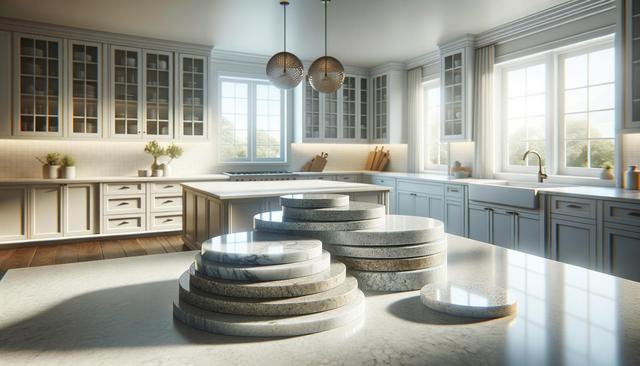What Are Quartz Countertops?
Quartz countertops are engineered stone surfaces made from a combination of natural quartz crystals and polymer resins. Unlike natural stone slabs such as granite or marble, quartz surfaces are manufactured in controlled environments, allowing for a consistent appearance and improved performance. The result is a non-porous, robust material that blends the beauty of stone with the benefits of modern engineering. Homeowners and designers appreciate quartz for its versatility, as it comes in a wide range of patterns and colors to suit various interior styles.
Quartz countertops are produced using ground quartz (which makes up about 90% of the material) combined with pigments and resins that bind everything together. This process creates surfaces that mimic the appearance of natural stone while offering enhanced durability and low maintenance. Their uniform design also makes them particularly appealing in contemporary spaces where consistency and clean lines are preferred.
Benefits of Quartz in Your Home
There are several reasons why quartz countertops have become a popular choice in residential and commercial settings. Their blend of visual appeal and practicality makes them a worthwhile consideration for kitchens, bathrooms, and other high-use areas. Some key advantages include:
- Durability: Quartz is highly resistant to scratches, chips, and stains, making it ideal for busy households.
- Low Maintenance: Unlike natural stone, quartz does not require sealing. A simple wipe with a damp cloth is usually enough to keep it clean.
- Non-Porous Surface: Quartz resists bacteria and mold growth, contributing to a healthier environment.
- Design Variety: The manufacturing process allows for a wide range of colors and patterns, including those that resemble marble or granite.
These benefits make quartz a practical yet attractive option. Whether you’re preparing food, hosting guests, or simply using your space daily, quartz countertops offer reliable performance without compromising style.
Design Flexibility and Aesthetic Appeal
One of the standout features of quartz countertops is their adaptability to various design themes. Whether your home features a rustic, modern, minimalist, or eclectic style, there’s likely a quartz pattern to match. The material can be crafted to resemble natural stone, concrete, or even solid colors, giving homeowners the freedom to align their countertops with the rest of their décor seamlessly.
Quartz surfaces can also be customized in terms of edge profiles, thickness, and finishes. From polished to matte and even textured options, these choices allow for unique, personalized installations. This level of customization has made quartz a go-to material for interior designers and architects aiming for both functionality and aesthetic harmony.
Additionally, quartz countertops can be used for more than just kitchen or bathroom counters. Consider incorporating them into:
- Backsplashes
- Waterfall islands
- Shower surrounds
- Window sills and wall cladding
These applications help create a cohesive look throughout your space while taking advantage of quartz’s durability and ease of maintenance.
Maintenance and Care Tips
One of the main draws of quartz countertops is their easy maintenance. While they are incredibly resilient, adopting a few good habits can help keep them looking new for years. Here are some tips for keeping your quartz surfaces in top condition:
- Clean spills promptly using a soft cloth and mild soap or a gentle surface cleaner.
- Avoid placing hot pots or pans directly on the surface; use trivets or hot pads to prevent potential damage from extreme heat.
- Do not use harsh chemicals or abrasive scrubbers that could dull the finish over time.
- Use cutting boards instead of cutting directly on the countertop to prevent unnecessary scratches—even though quartz is scratch resistant.
Routine cleaning and cautious daily use will help maintain the appearance and integrity of your quartz countertops. Since the material is non-porous, it won’t absorb liquids or harbor bacteria, making it an excellent choice for food preparation areas.
Cost and Installation Considerations
Quartz countertops typically fall in the mid-to-high price range when compared to other surface materials. While the upfront cost may be higher than laminate or tile, the long-term value often justifies the investment. The surface’s durability, low maintenance, and aesthetic versatility contribute to its enduring popularity among homeowners looking for a lasting solution.
The installation process should be handled by professionals due to the weight and precision required. Quartz slabs are heavy and must be cut and fitted accurately. A proper installation ensures the longevity and performance of the material. Some factors that may influence the cost include:
- Complexity of the installation (e.g., custom edges, sink cutouts)
- Size and thickness of slabs
- Brand and pattern selection
- Regional labor rates
While it’s possible to find budget-friendly options, investing in quality installation is crucial to maximizing the benefits of quartz countertops. Be sure to consult with a reputable contractor or supplier to explore options that fit both your design vision and budget.




Leave a Reply